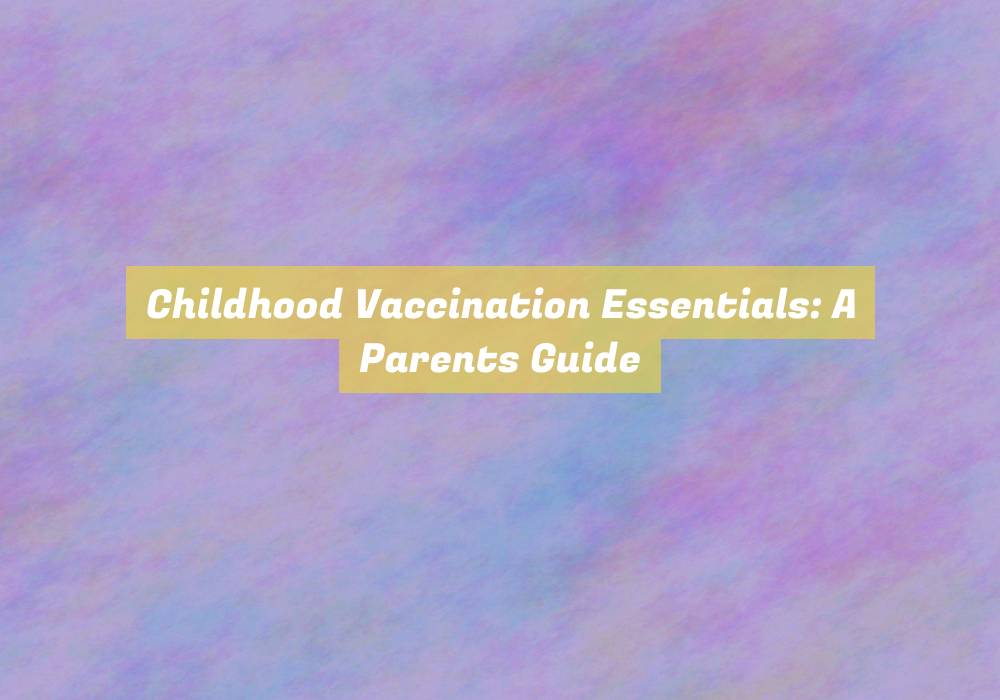Childhood Vaccination Essentials: A Parents Guide
You may not be aware that childhood vaccinations are not only essential for your childG??s health, but they also play a significant role in protecting the community from the spread of infectious diseases.
Understanding the immunization schedule and debunking common myths surrounding vaccinations can be overwhelming, but as a parent, you have the responsibility to make informed decisions.
Managing potential vaccine side effects is also crucial.
As you navigate through the complex world of childhood vaccinations, itG??s important to have a comprehensive guide that can provide you with the necessary information and support.
Importance of Childhood Vaccinations
Childhood vaccinations are crucial for protecting your child from serious and potentially life-threatening diseases. By ensuring your child receives the recommended vaccinations, you arenG??t only safeguarding their health but also contributing to the overall community immunity. Vaccinations work by introducing a small, weakened, or inactive part of a virus or bacteria into the body. This triggers the immune system to produce antibodies, which will recognize and fight off the specific disease-causing organism if your child is ever exposed to it in the future.
ItG??s important to understand that vaccines not only protect your child but also help prevent the spread of infectious diseases to others who may be more vulnerable, such as infants who are too young to be fully vaccinated or individuals with weakened immune systems. By vaccinating your child, youG??re playing a vital role in creating a protective shield for your family and the community at large.
The benefits of childhood vaccinations far outweigh the potential risks, and theyG??re a cornerstone of preventive healthcare for your child.
Understanding the Immunization Schedule
To ensure your child receives the recommended vaccinations and continues to benefit from their protective effects, understanding the immunization schedule is crucial. The immunization schedule outlines the specific vaccines your child needs and the recommended ages for administration. By following this schedule, you can ensure that your child is protected from various infectious diseases at the appropriate times in their development. The schedule is designed based on extensive research and scientific evidence to provide the most effective immunity at the earliest possible age.
The immunization schedule typically starts at birth, with the first dose of the hepatitis B vaccine. From there, it continues throughout infancy and childhood, with vaccines for diseases like polio, measles, mumps, rubella, and more. ItG??s important to adhere to the schedule and not delay vaccinations, as this could leave your child vulnerable to potentially serious illnesses.
Debunking Common Myths
DonG??t let misinformation cloud your understanding of childhood vaccinations. ItG??s crucial to separate fact from fiction when it comes to the health of your child.
One prevalent myth is that vaccines cause autism. However, numerous studies have shown no link between vaccines and autism.
Another common misconception is that natural immunity is better than vaccine-induced immunity. While natural immunity can provide strong protection, it often comes at the cost of severe illness or even death. Vaccines offer a safer way to build immunity without risking your childG??s health.
Additionally, some parents worry that vaccines overwhelm a childG??s immune system. The truth is that the immune system is constantly exposed to countless germs, and vaccines pose a minimal challenge in comparison.
Another unfounded belief is that vaccine-preventable diseases have been eradicated, making vaccinations unnecessary. In reality, these diseases still exist and can quickly reemerge if vaccination rates drop.
Managing Vaccine Side Effects
Amid concerns about childhood vaccination, itG??s important to address the management of vaccine side effects to ensure the well-being of your child.
While most children experience no or mild side effects from vaccines, itG??s essential to be prepared in case your child does have a reaction. Common side effects such as soreness at the injection site, mild fever, or fussiness typically subside within a few days. You can manage these symptoms by applying a cool, damp cloth to the injection site, offering plenty of fluids, and giving age-appropriate pain relievers as recommended by your healthcare provider.
In rare cases, more severe side effects like high fever, persistent crying, or unusual behavior may occur. If your child experiences these, seek medical attention immediately.
ItG??s crucial to stay informed about potential side effects specific to each vaccine your child receives. Keep track of your childG??s vaccination schedule and take note of any unusual symptoms that may arise.
Conclusion
Now that you have a better understanding of childhood vaccinations, you can make informed decisions for your childG??s health. Remember to follow the immunization schedule and consult with your healthcare provider to address any concerns or questions.
By staying informed and proactive, youG??re taking important steps to protect your child from preventable diseases and ensuring their overall well-being. Keep up the good work, parent!




